Vilasi G. Hamiltonian Dynamics
Подождите немного. Документ загружается.

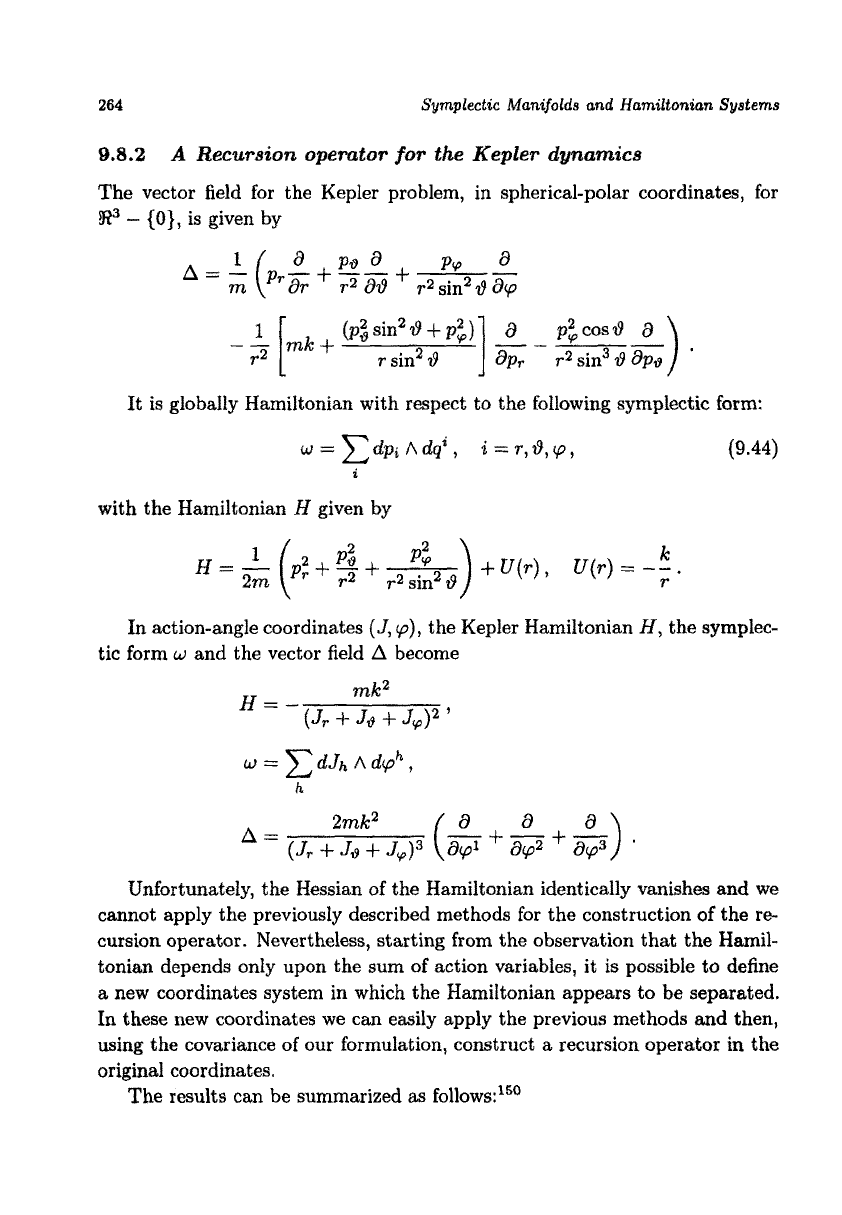
264
Symplectic
Manifolds and Hamiltonian
Systems
9.8.2
The vector field
for
the Kepler problem, in spherical-polar coordinates, for
!R3
-
(01,
is given by
A
Recursion operator
for
the
Kepler
~~n~~~c~
PS
a
PP
a
(pT-
+
--
+
--
m
ar
r2
ad
r2sin2ddp
A
=
-1
r2
[mk+
It
is globally Hamiltonian with respect to the following symplectic
farm:
w=xdpiAdqi,
i=r,d,q,
(9.44)
i
with the H~iltonian
I?
given by
In action-angle coordinates
(J,
p),
the Kepler Hamiltonian
H,
the symplec-
tic form
w
and the vector field
A
become
mk2
H=-
(4
+
J8
+
&)2
'
h
2mk2
a a
a
A=
(J,+JG+J,)3
(a,l+@+@)
'
UnfortunateIy, the Hessian
of
the Hamiltonian identically vanishes and we
cannot apply the previously described methods for the construction of the
re-
cursion operator. Nevertheless, starting
from
the observation that the Hamil-
tonian depends only upon the sum of action variables,
it
is possible to define
a
new coordinates system
in
which the Hamiltonian appears to be separated.
In
these new coordinates we can easily apply the previous methods
and
then,
using the covariance
of
our formulation, construct
a
recursion operator
in
the
original coordinates.
The results can be summarized
as
follows:'5o
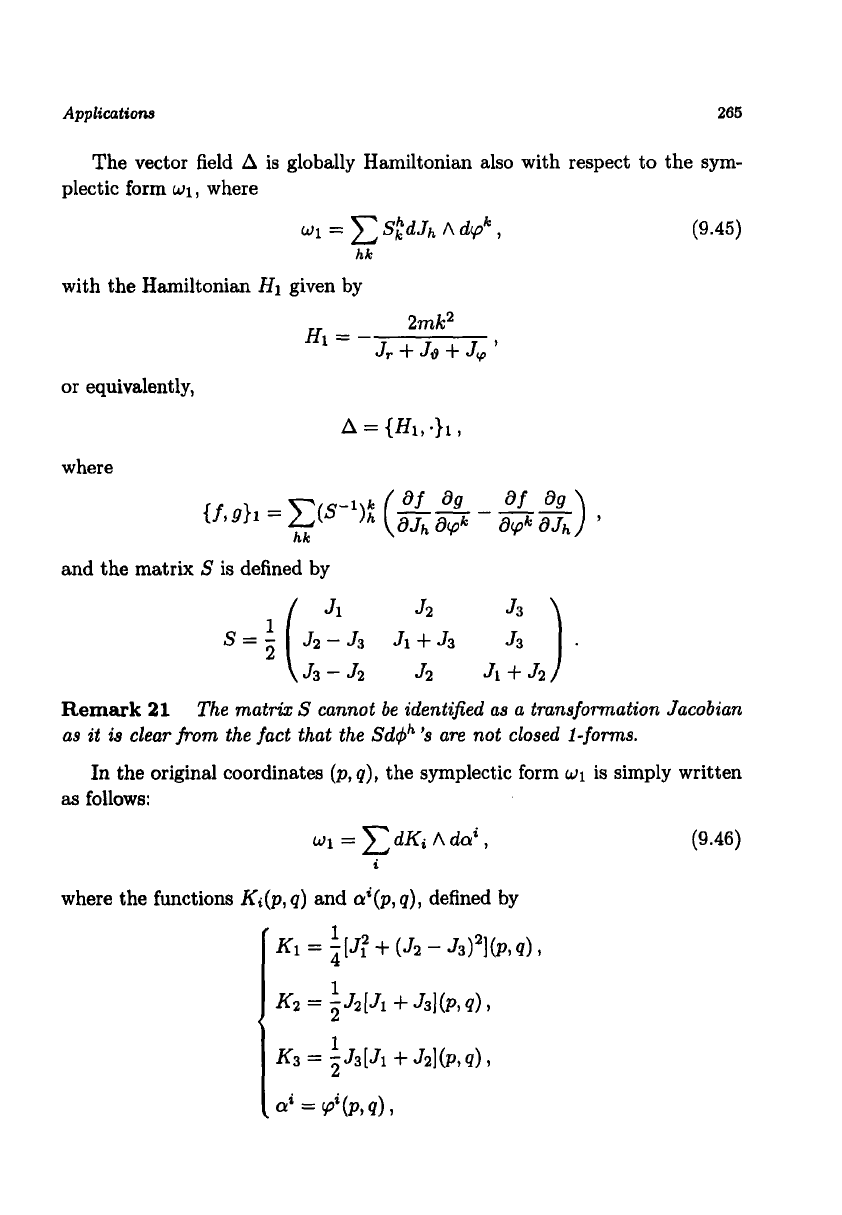
Applications
265
The vector field
A
is globally Hamiltonian also with respect
to
the
sym-
plectic form
w1
where
~1
=
s,hdJh
A
dvk,
(9.45)
hk
with the Hamiltonian
HI
given by
2mk2
J,
+
JG
+
Jq
’
HI
=
-
or
equivalently,
where
and the matrix
S
is defined by
2
).
J1
J2
&A(
2
J2
-
J3
51
+
J3
J3
-
J2
J2
J1
+
J2
Remark
21
as
at
b
clear
from
the fact that the Sdcph’s are not closed 1-forms.
as
follows:
The matrix
S
cannot
be
identified as a transformation Jacobian
In the original coordinates
(p,
q),
the symplectic form
w1
is simply written
~1
=
CdKi
Add,
(9.46)
i
where the functions
Ki(p,
q)
and
ai(p,
q),
defined by
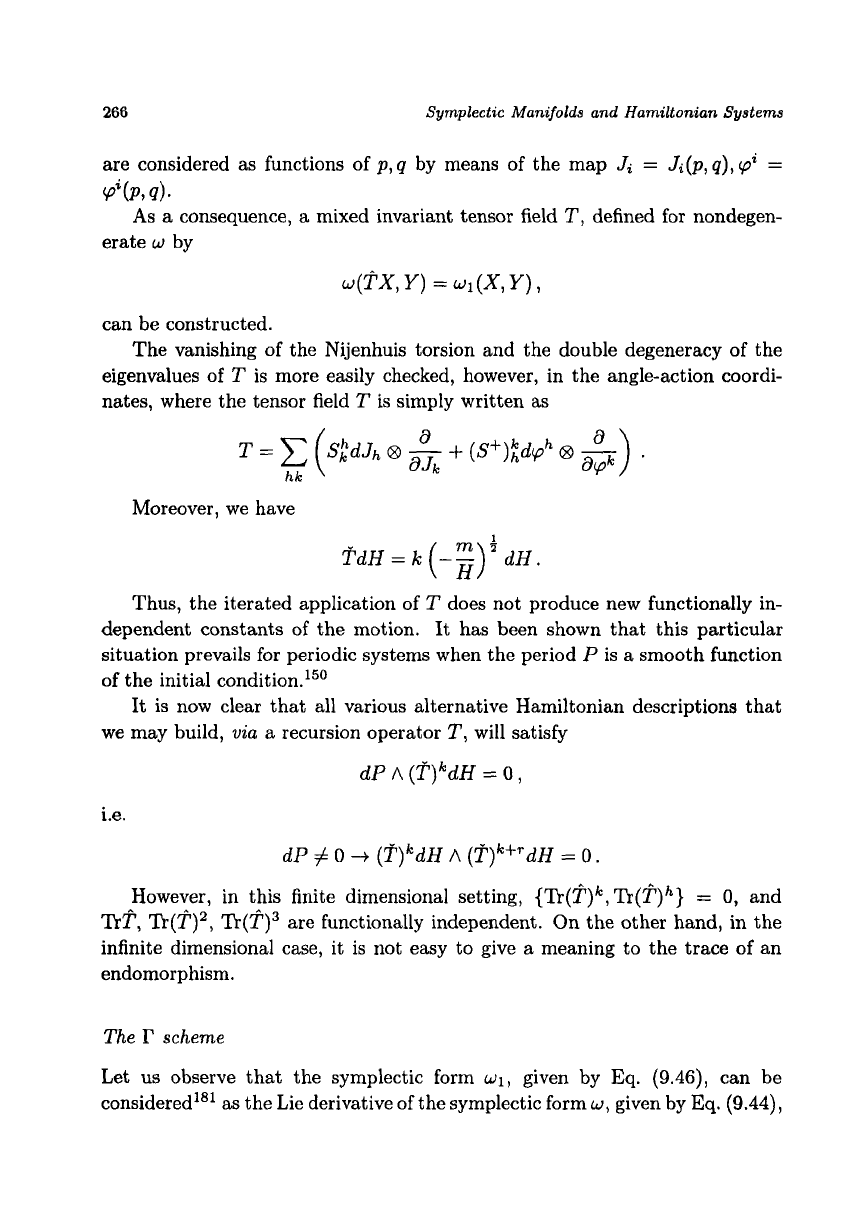
266
Symplectic
Manafolds and Hamiltonian Systems
are considered as functions of
p,
q
by means of the map
Ji
=
&(p,
q),
pi
=
As
a
consequence,
a
mixed invariant tensor field
T,
defined for nondegen-
Pi
(P,
4.
erate
w
by
W(FX,
Y)
=
w1
(X,
Y)
,
can be constructed.
The vanishing of the Nijenhuis torsion and the double degeneracy of the
eigenvalues of
T
is more easily checked, however, in the angle-action coordi-
nates, where the tensor field
T
is
simply written as
Moreover, we have
TdH
=
lc
(-z)'dH.
Thus, the iterated application of
T
does not produce new functionally in-
dependent constants
of
the motion. It has been shown that this particular
situation prevails for periodic systems when the period
P
is
a
smooth function
of the initial ~ondition.'~'
It
is now clear that all various alternative Hamiltonian descriptions that
we
may build,
via
a
recursion operator
T,
will satisfy
dP
A
(T)'dH
=
0,
i.e.
dP
#
0
+
(T')'dH
A
(T)'"+'dH
=
0.
However, in this finite dimensional setting,
{TI@)
k,Tl(p)h}
=
9,
and
Trp,
Tr(?)2,
Tr(p)3
are functionally independent. On the other hand, in the
infinite dimensional case, it is not easy to give
a
meaning
to
the trace
of
an
endomorphism.
The
I'
scheme
Let us observe that the symplectic form
w1,
given by Eq.
(9.46),
can be
considered'81
as
the Lie derivative of the symplectic form
w,
given by
Eq.
(9.44),
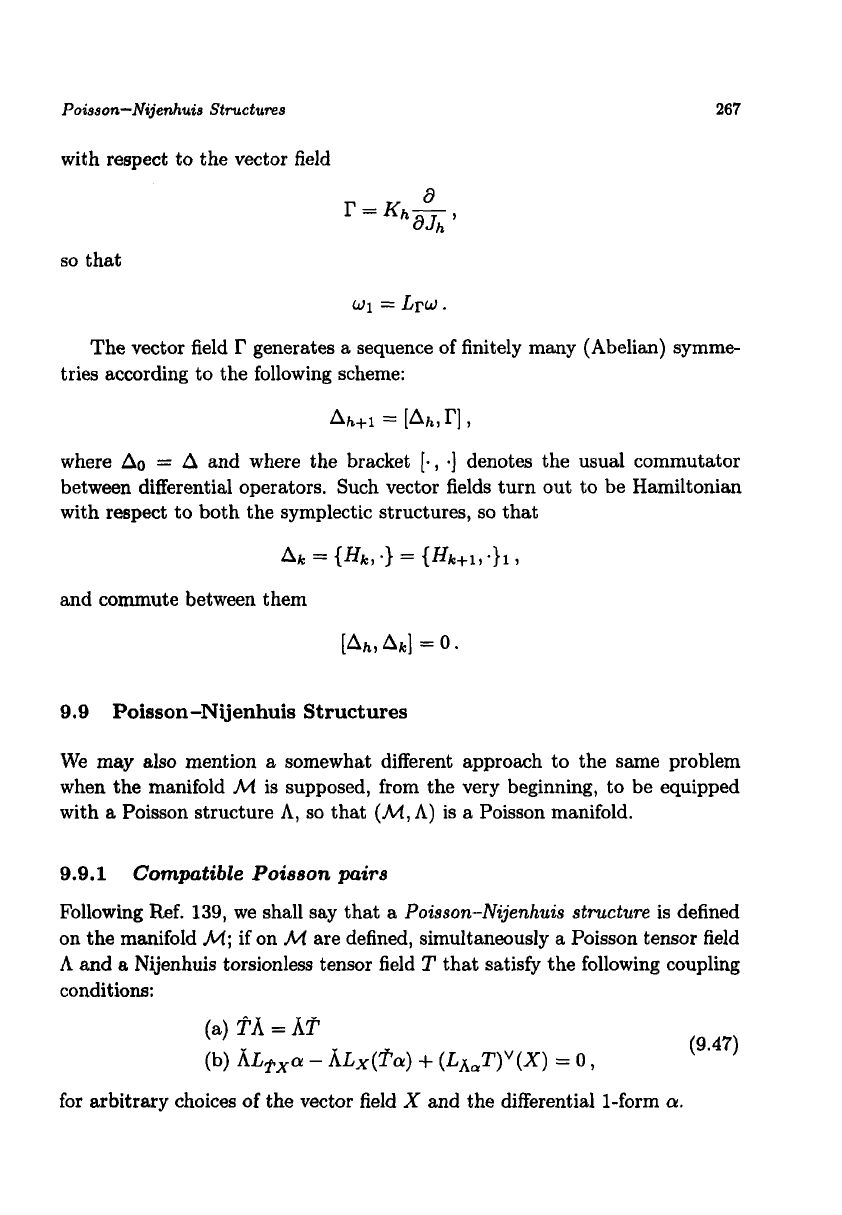
Poisson-Najenhuaa
Strvctures
267
with respect to the vector field
so
that
The vector field
r
generates a sequence of finitely many (Abelian) symme-
tries according to the following scheme:
Ah+l
=
[Ah,
r]
1
where
A0
=
A
and where the bracket
[,,
-1
denotes the usual commutator
between differential operators. Such vector fields turn out to be Hamiltonian
with respect to both the symplectic structures,
so
that
and commute between them
9.9
Poisson-Nijenhuis Structures
We may also mention
a
somewhat different approach to the same problem
when the manifold
M
is supposed, from the very beginning, to be equipped
with
a
Poisson structure
A,
so
that
(M,
A)
is a Poisson manifold.
9.9.1
Compatible
Poisson
pairs
Following Ref.
139,
we shall say that a
Poisson-Nijenhuis structure
is defined
on the manifold
M;
if on
M
are defined, simultaneously a Poisson tensor field
A
and
a
Nijenhuis torsionless tensor field
T
that satisfy the following coupling
conditions
:
(a)
FA
=AT
(9.47)
(b)
kLpxa
-
AL~(T&)
+
(Lj&I')"(X)
=
0,
for arbitrary choices of the vector
field
X
and the differential 1-form a.
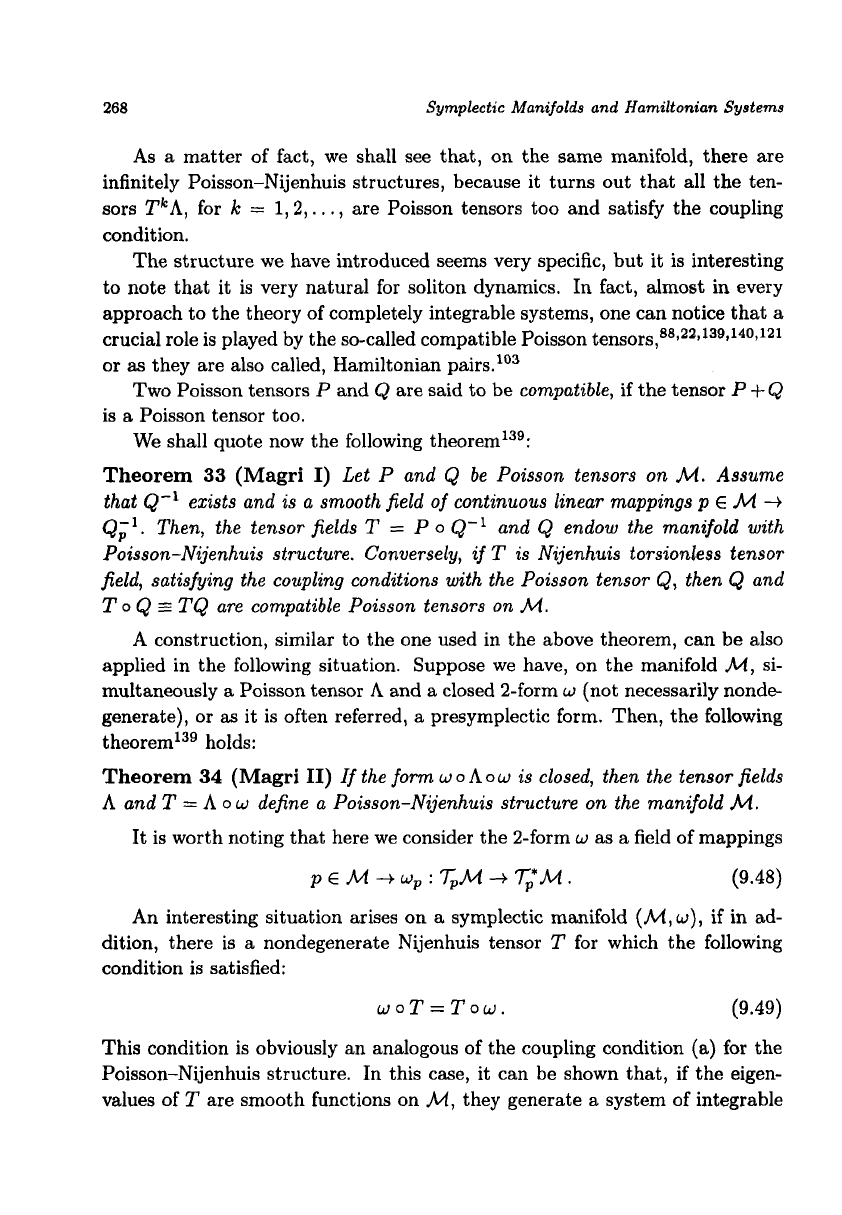
268
Symplectic
Manifolds and Hamiltonian
Systems
As
a
matter of fact, we shall see that, on the same manifold, there are
infinitely Poisson-Nijenhuis structures, because it turns out that all the ten-
sors
TkA,
for
k
=
1,2,.
. .
,
are Poisson tensors too and satisfy the coupling
condition.
The structure we have introduced seems very specific, but it is interesting
to note that it is very natural for soliton dynamics.
In
fact, almost in every
approach to the theory of completely integrable systems, one can notice that
a
crucial role is played by the so-called compatible Poisson
ten~~r~,~~~~~~~~~~~~~~~~~
or
as
they are also called, Hamiltonian pairs.lo3
Two Poisson tensors
P
and
Q
are
said to be
compatible,
if the tensor
P
+
Q
is
a
Poisson tensor too.
We shall quote now the following theorem139:
Theorem
33
(Magri
I)
Let
P
and
Q
be Poisson tensors on
M.
Assume
that
Q-l
exists and is a smooth field of continuous linear mappings
p
E
M
+
Q;'.
Then, the tensor fields
T
=
P
o
Q-'
and
Q
endow the manifold with
Poisson-Nijenhuis structure. Conversely,
if
T
is Nijenhuis torsionless tensor
field, satisfying the coupling conditions with the Poisson tensor
Q,
then
Q
and
To
Q
A construction, similar to the one used in the above theorem, can be also
applied in the following situation. Suppose we have, on the manifold
M,
si-
multaneously
a
Poisson tensor
A
and
a
closed 2-form
w
(not necessarily nonde-
generate),
or
as
it is often referred,
a
presymplectic form. Then, the following
theorem'39 holds:
Theorem
34
(Magri
11)
If
the form w
o
A
o
w is closed, then the tensor fields
A
and
T
=
A
ow
define a Poisson-Nijenhuis structure on the manifold
M.
It is worth noting that here we consider the 2-form
w
as
a
field of mappings
(9.48)
An interesting situation arises on
a
symplectic manifold
(M,
w),
if in
ad-
dition, there
is
a
nondegenerate Nijenhuis tensor
T
for which the following
condition is satisfied:
TQ
are compatible Poisson tensors on
M.
p~
M
+
wp:
7,M
-+
TM.
WOT=TOW.
(9.49)
This condition is obviously an analogous of the coupling condition
(a)
for the
Poisson-Nijenhuis structure. In this case, it can be shown that, if the eigen-
values of
T
are smooth functions on
M,
they generate
a
system of integrable
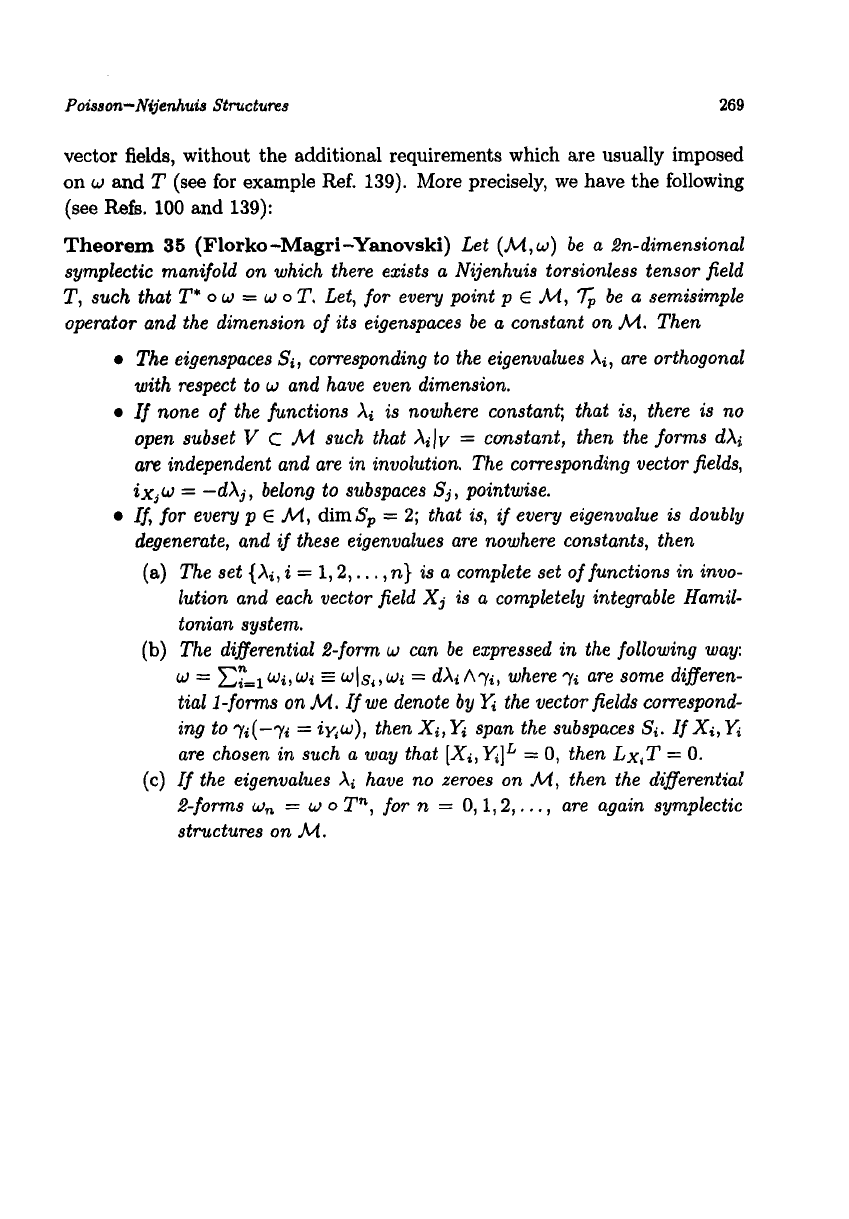
Poisson-Nijenhuis
Structures
269
vector
fields,
without the additional requirements which are usually imposed
on
w
and
T
(see for example Ref.
139).
More precisely, we have the following
(see
Refs.
100
and
139):
Theorem
35
(Florko-Magri-Yanovski)
Let
(M,
w)
be a Bn-dimensional
symplectic manifold on which there exists a Nijenhuis torsionless tensor field
T,
such that
T*
o
w
=
w
o
T.
Let, for every point p
E
M,
7p
be a semisimple
operator and the dimension of its eigenspaces be a constant on
M.
Then
The eigenspaces
Si,
corresponding to the eigenvalues
Xi,
are orthogonal
with respect to
w
and have even dimension.
If
none of the functions
Xi
is
nowhere constant; that
is,
there
is
no
open subset
V
c
M
such that
XiJv
=
constant, then the
forms
dXi
are independent and are
in
involution. The corresponding vector fields,
ixjw
=
-dXj, belong to subspaces
Sj,
pointwise.
If,
for every p
E
M,
dims,
=
2;
that is,
if
every eigenvalue
is
doubly
degenerate, and
if
these eigenvalues are nowhere constants, then
(a)
The set
{Xi,
i
=
1,2,.
.
.
,
n} is a complete set of functions
in
invo-
lution and each vector field
Xj
is a completely integrable Hamil-
tonian system.
(b)
The diflerential
%form
w
can be expressed
in
the following way:
w
=
CE1
wj,wi
EE
w(s,,wj
=
dXj
Arj,
where
vi
are some differen-
tial
l-forms
on
M.
If
we denote by
yi
the vector fields correspond-
ing to
rj(-ri
=
iy,w),
then
Xi,
yi
span the subspaces
Sj.
If
Xi,
yi
are chosen
in
such a way that
(c)
If
the eigenvalues
Xi
have no zeroes on
M,
then the digerential
,%-foms
w,,
=
w
o
Tn,
for
n
=
0,1,2,.
. .
,
are again symplectic
structures on
M.
=
0,
then
LxiT
=
0.

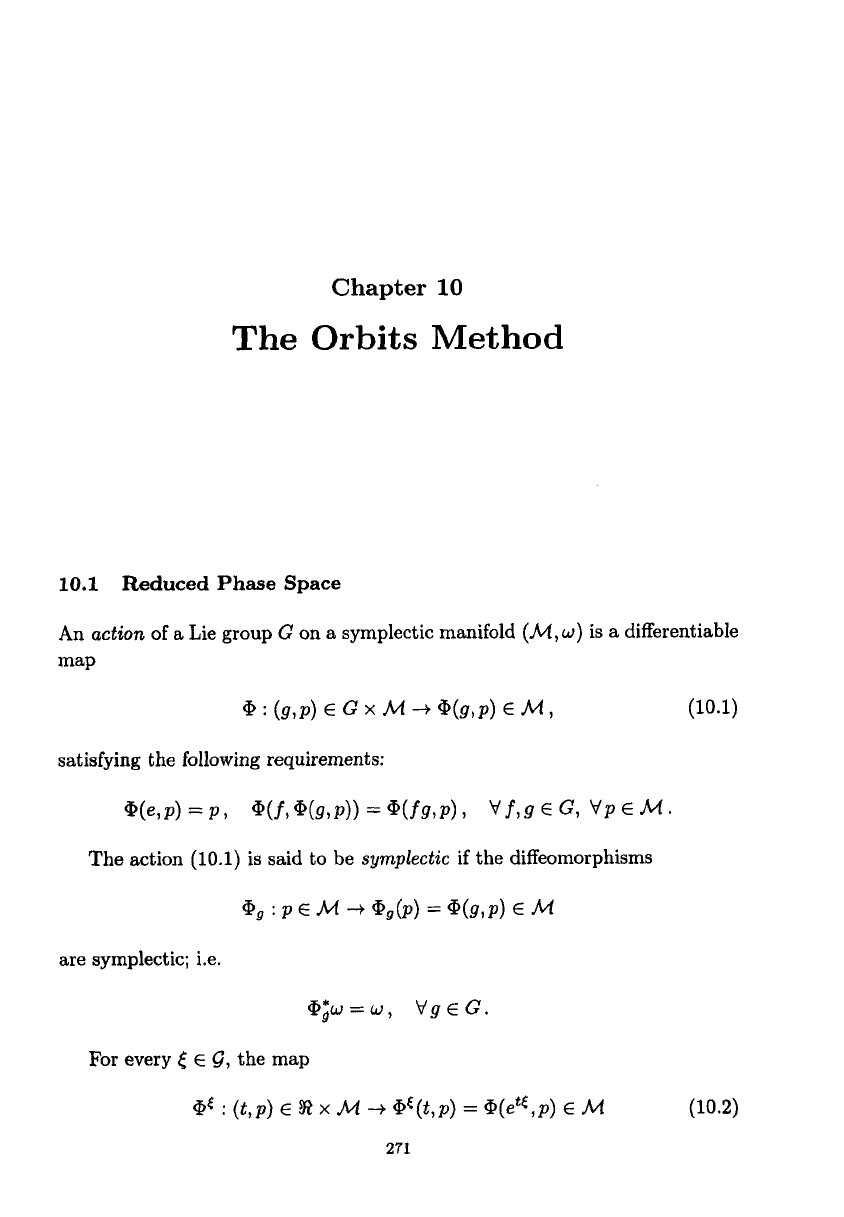
Chapter
10
The
Orbits
Method
10.1
Reduced
Phase
Space
An
action
of
a
Lie group
G
on
a
symplectic manifold
(M,
u)
is
a
differentiable
map
satisfying the following requirements:
@(.lP)
=
P
,
@(f,
@b,P))
=
@(fg,p)
1
Vf,g
E
G,
VP
E
M
*
The action
(10.1)
is
said to be
symplectic
if the diffeomorphisms
are symplectic; i.e.
@;w
=
W,
Vg
E
G.
For
every
<
E
9,
the map
@€
:
(t,p)
E
92
x
M
-+
@(t,p)
=
@(etE,p)
E
M
(10.2)
271
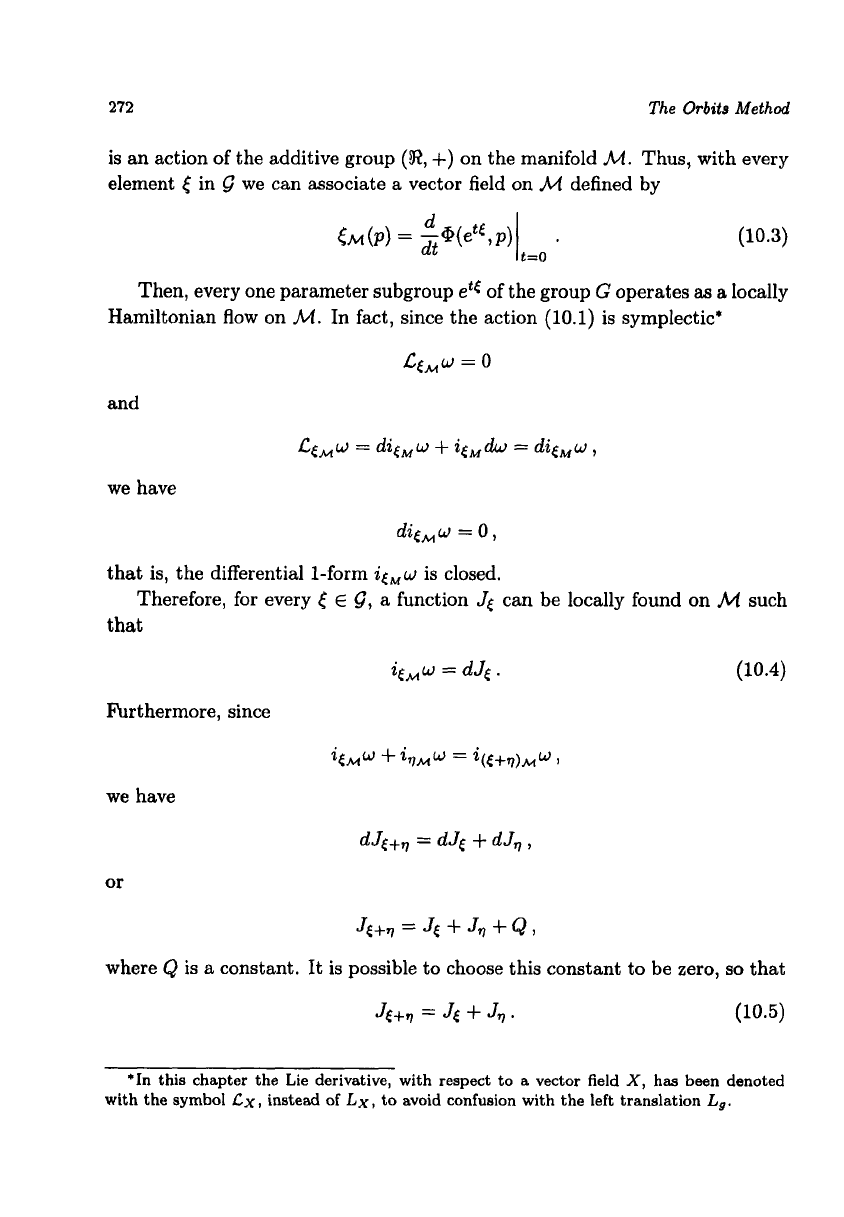
272
The
Orbits
Method
is an action of the additive group
(8,
+)
on the manifold
M.
Thus, with every
element
<
in
B
we can associate a vector field on
M
defined by
(10.3)
Then, every one parameter subgroup
et(
of the group
G
operates
as
a
locally
Hamiltonian flow on
M.
In fact, since the action
(10.1)
is symplectic*
C(,W
=
0
and
L(,w
=
dit,w
+
i<,&
=
dic,w,
we have
dic,w
=
0,
that is, the differential 1-form
&W
is closed.
that
Therefore, for every
[
E
B,
a
function
Jc
can be locally found on
M
such
icMw
=
dJ6.
(10.4)
Furthermore, since
we have
or
Jc+q
=
Jt
+
Jq
+
Q
7
where
Q
is
a
constant. It
is
possible to choose this constant to be zero,
so
that
Jc+V
=
J(
+
Jq
.
(10.5)
~~~
*In
this chapter the
Lie
derivative, with respect to
a
vector field
X,
has been denoted
with the symbol
Cx,
instead
of
Lx,
to avoid confusion with the left translation
L,.
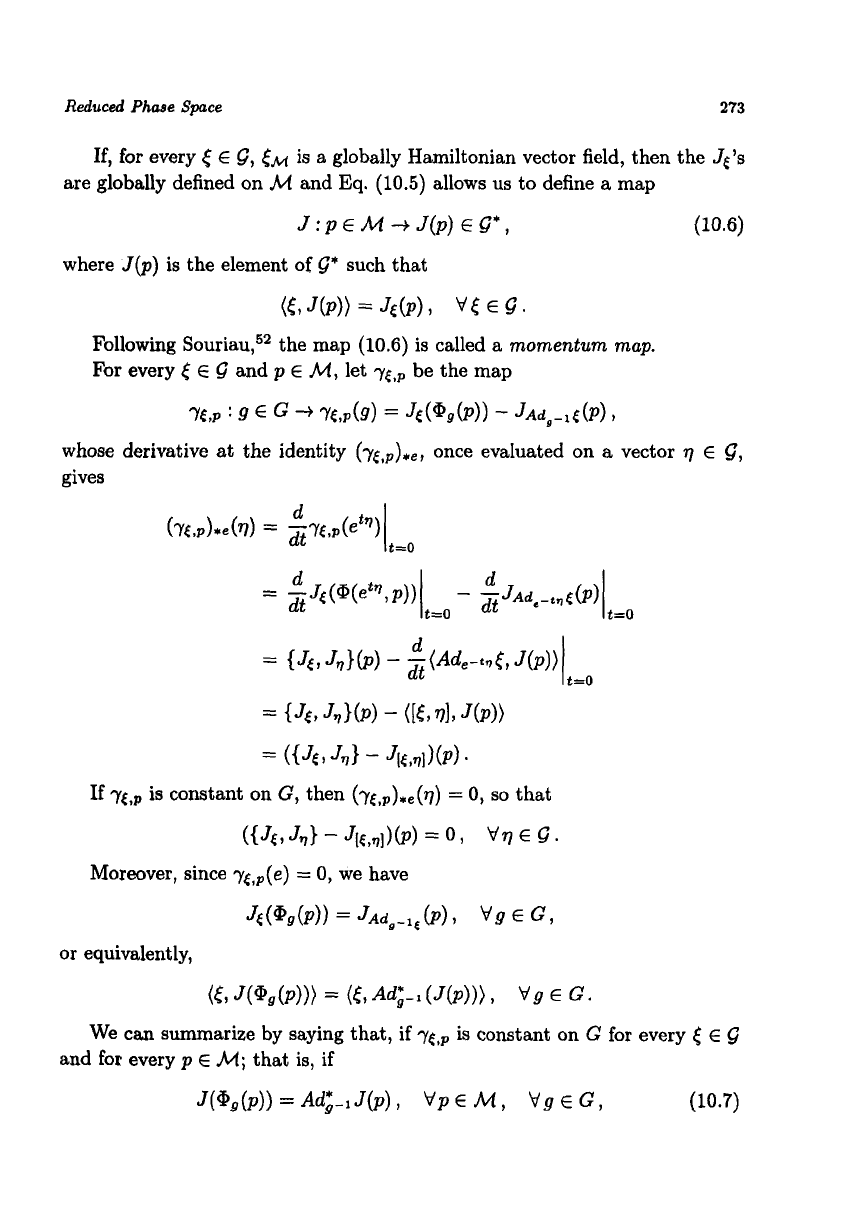
Reduced
Phase
Space
273
If,
for every
5
E
0,
&
is a globally Hamiltonian vector field, then the
Jt’s
are globally defined on
M
and
Eq.
(10.5)
allows
us
to define a map
J:p~hi+J(p)~8*,
(10.6)
where
J(p)
is the element
of
Q*
such that
((7
J(P))
=
J&>
1
vt
E
B
*
Following
sou ria^,^^
the map
(10.6)
is
called a
momentum
map.
For
every
(
E
B
and
p
E
M,
let
7~,~
be the map
7€,p
:
9
E
G
-+
7(,p(S)
=
Jt(@p,(p))
-
JAd,-l€(p)
,
whose derivative
at
the identity
(T€,~)*~,
once evaluated on
a
vector
q
E
B,
gives
d
(+/t,p)*e(v)
=
z7t9p(et’)/
t=O
